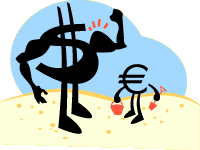 |
 |
 |
|
|||

Europe On Sale

Blame it on the euro. More accurately, credit the euro's huge drop for making this one of the most affordable times to visit Western Europe in recent history. There's one footnote to that statement, and it's called England. Which is not one of the 11 countries that's part of the euro deal. The British pound remains strong, making London one of the most expensive destinations for Americans these days. But let's focus on the good news. First of all, the euro was born on the first day of 1999. That's when those 11 countries agreed to link the value of their money to the value of the euro. Now, euros won't actually exist as bills and coins until 2002. Even then, you'll find many prices expressed in both the local currency as well as in euros when you visit stores or receive credit card bills at restaurants and hotels. And since the currency of the participating countries is linked to the euro, if the euro falls in relation to, say, the U.S. dollar, so do French francs, Italian lire, German marks, and so on. And, boy, has the euro been sinking. Sixteen-and-a-half months ago, it took almost $1.20 to buy one. Now it only takes 90 cents! Which means if you paid $200 for a night in a Paris hotel in January of 1999, it'll only cost you about $150 today. A five dollar sandwich then costs $3.80 now. And the savings are the same in Austria, Belgium, Finland, Italy, Ireland, Luxembourg, Germany, the Netherlands, Portugal and Spain. And there's more good news for U.S. travelers, because other, non-euro, currencies in the region have fallen against the dollar, too. Last May, a dollar fetched one-and-a-half Swiss francs; now it gets you 1.70 in francs. In Greece, a buck got you 304 drachmas a year ago; now it's more like 374. And to make things even better, inflation was less than two percent last year in most of Europe, meaning prices have hardly gone up. Except in Turkey, where inflation has run wild. Who knows how long the euro will stay down? European bankers keep threatening to intervene to try to drive up the value. But there's no guarantee that will work. Economists say Europe's solid economy, growing at about half the rate of America's, will eventually turn around the decline of the euro. Until then, enjoy getting seven francs to the dollar in France instead of the six you would have gotten just last fall. Splurge in Spain, where a dollar buys 185 pesetas compared to 153 a year ago. For the moment, the dollar is once again king. |
 | American Public Media Home | Search | How to Listen ©2004 American Public Media | Terms of Use | Privacy Policy |